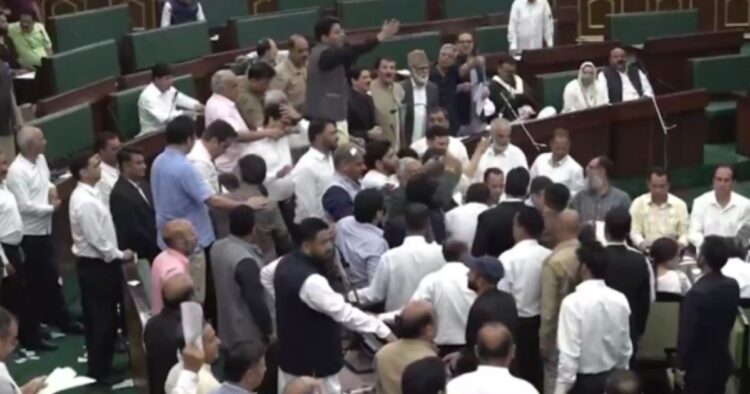There was a big uproar in the Jammu and Kashmir Assembly on Monday regarding the Waqf (Amendment) Bill that was recently passed in Parliament. The ruling National Conference (NC) wanted to discuss the new law, which was approved after President Droupadi Murmu signed it. The NC submitted a notice asking for a special discussion on the law, but the Speaker of the Assembly refused. This led to a lot of noise and chaos in the House.
Ruckus In Jammu & Kashmir Assembly Over Waqf Act
Ruling party lawmakers in Jammu and Kashmir tried to move close to the Speaker in protest over the Waqf (Amendment) Bill. The Speaker explained that the matter is still in court and according to the rules, they couldn’t discuss it yet.
Both the BJP and the National Conference (NC) started shouting slogans in the House. NC MLA Tanvir Sadiq said his party is against the Waqf Act and wants to discuss it. He said, “Jammu and Kashmir is a Muslim-majority state, and we oppose the Waqf Amendment Bill.”
BJP lawmakers responded, asking why there should be a discussion when the Bill is already a law. The NC MLAs told the Speaker they wouldn’t stop until their request for a discussion was accepted. They also waved black flags in the Assembly to protest against the Act.
PDP Attacks NC Government
Meanwhile, former Jammu and Kashmir Chief Minister and PDP leader Mehbooba Mufti criticized the NC government. Mufti tweeted on X (former Twitter), “It’s profoundly disappointing that the speaker J&K Assembly has rejected the motion on the Waqf Bill. Despite securing a strong mandate, the government appears to have completely yielded to the BJP’s anti-Muslim agenda, cynically attempting to appease both sides. The National Conference (NC) could learn from Tamil Nadu’s government, which has firmly opposed the Waqf Bill. In J&K, the only Muslim-majority region, it’s alarming that a supposedly people-centric government lacks the courage even to debate this critical issue”.
The new law has been challenged in the Supreme Court by AIMIM leader Asaduddin Owaisi and Congress MP Mohammed Javed. They claim the law goes against constitutional rights. But the central government has defended the Act, saying it does not interfere with any religious practices and is only meant to bring transparency and stop misuse of Waqf properties.
Home Minister Amit Shah said that the Waqf Board is for administration, not for religion. He accused some political leaders of spreading fear just to protect their vote bank. He also said the law protects the rights of poor Muslims, especially Pasmanda Muslims, and ensures representation of Muslim women in Waqf Boards.
Waqf refers to religious endowments in Islam. These are lands or properties donated for religious or charitable purposes. The Waqf Board is responsible for managing these properties.
Waqf Act
The Waqf Amendment Bill was passed in Parliament after two long debates in the Lok Sabha and Rajya Sabha on consecutive days. The discussions went on late into the night.
In the Lok Sabha, the Bill was passed with 288 votes in favor and 232 votes against it. In the Rajya Sabha, 128 votes supported the Bill, while 95 votes were against it.
The new law will be called the Waqf (Amendment) Act, 2025. Under this change, the word “Waqf” will be replaced with “Unified Waqf Management, Empowerment, Efficiency and Development” (UMEED).

















Comments